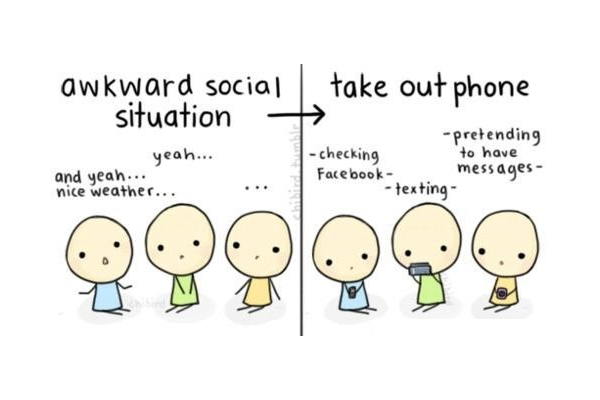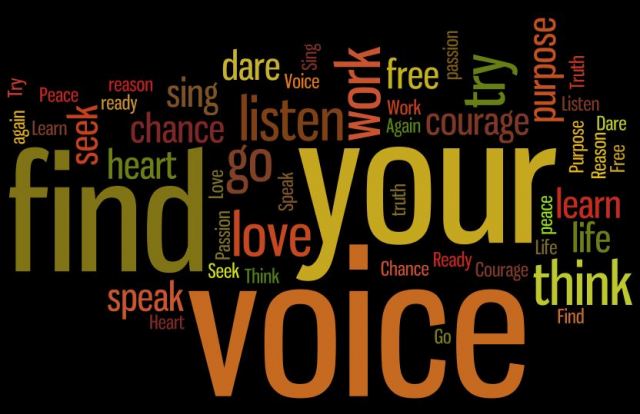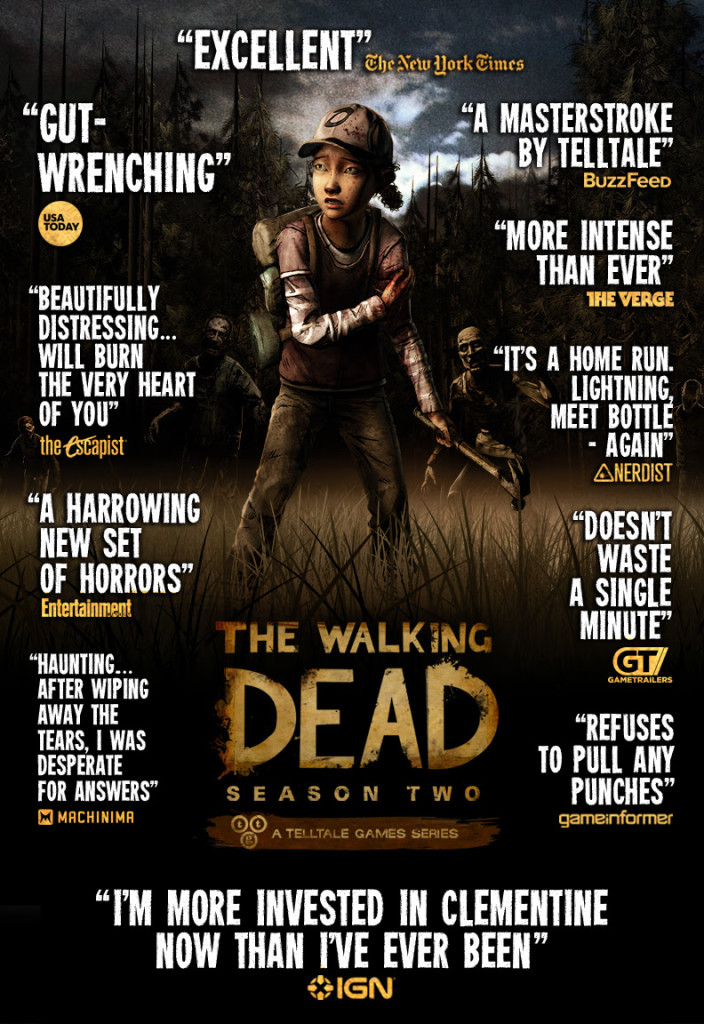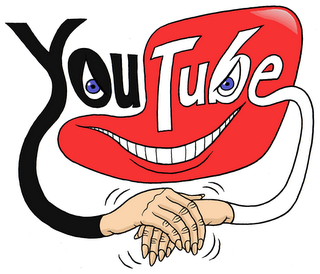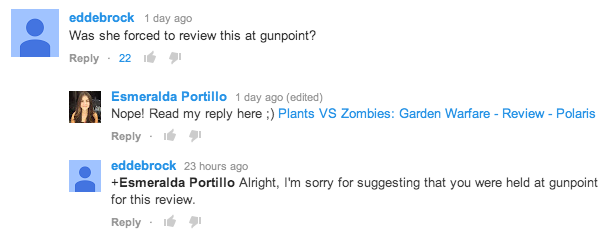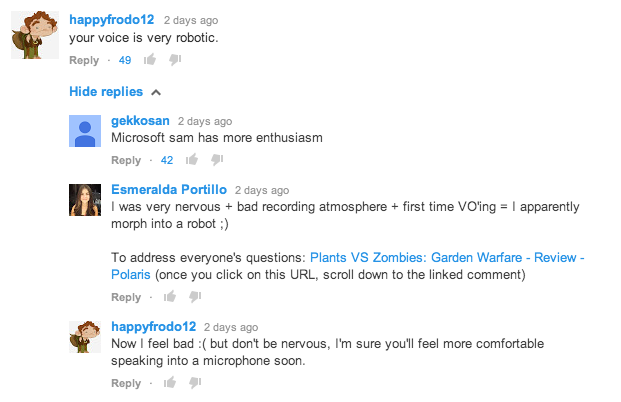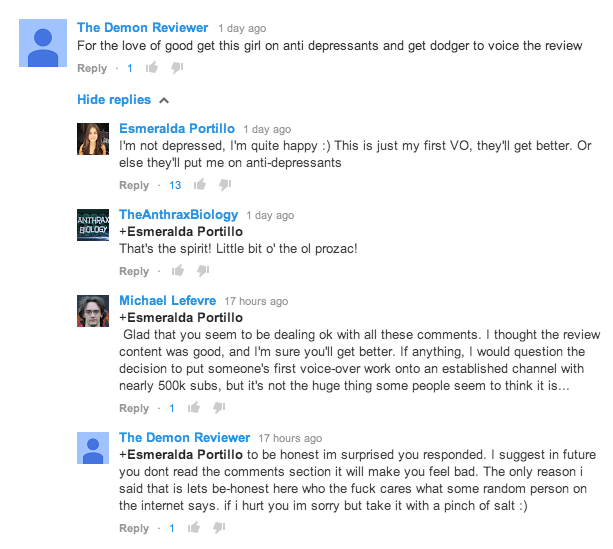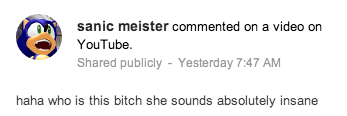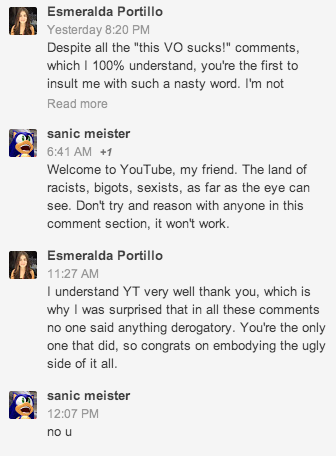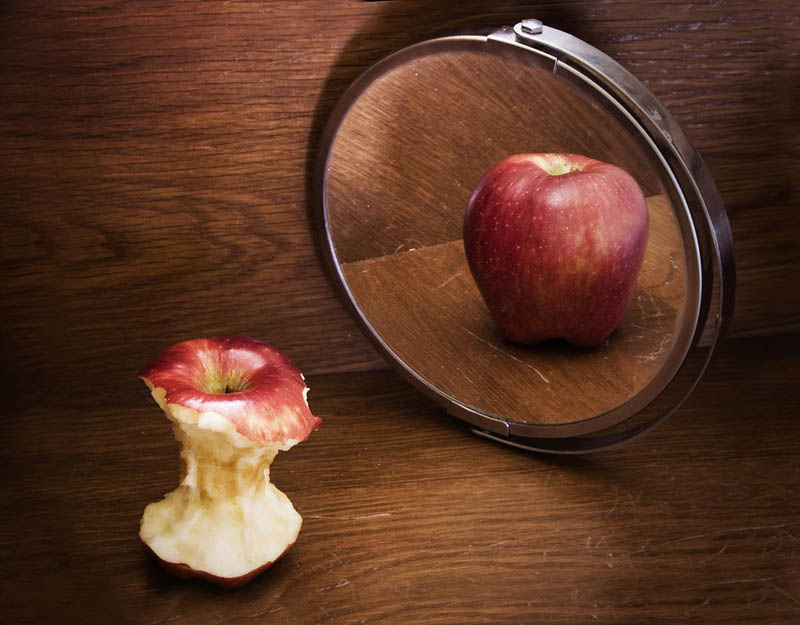-

Pokemon Go: The Impact Around the World
 It’s only been a few days since Pokémon Go launched in the U.S., Australia, and New Zealand, but there’s no denying its impact and popularity. Droves of people are making their way to local parks and churches to stare intensely at their phones while they catch fictional monsters from nearby PokeStops tagged with lures and battling for ownership of the gym across the street.
It’s only been a few days since Pokémon Go launched in the U.S., Australia, and New Zealand, but there’s no denying its impact and popularity. Droves of people are making their way to local parks and churches to stare intensely at their phones while they catch fictional monsters from nearby PokeStops tagged with lures and battling for ownership of the gym across the street.This is an interesting phenomenon, but how far does the Pokémon Go impact actually go? Well if this ever growing list of stories is any indication, society wasn’t prepared for this game:
Criminal Activity and Advisories
- Pokémon Go player finds body while searching for Pokémon
- Pokémon Go led 11 teens right into an armed robbery
- Man stabbed multiple times by group of attackers at Anaheim park while playing Pokémon Go
- 2 California men fall off edge of ocean bluff while playing Pokémon Go
- Pokémon Go helps two Marines to catch a murder suspect in Fullerton
- Police urge gamers to stop trying to catch Sandshrew in Darwin police station
- Texas Department of Transportation says, “Y’all, please don’t make us have to create a campaign called “Don’t Pokémon Go and Drive”
- Dutch rail operator tells Nintendo to change game after players wander onto tracks
- Pokémon Go craze causes safety concerns
- Nations of the world confront the Pokémon menace (national security threats and all) NEW!

Inconveniences
- Holocaust museum to visitors: Please stop catching Pokémon here
- Children’s hospital warns staff about Pokemon GO players entering restricted areas
- Help, my house is a Pokémon Go gym – the reality of living in a virtual space
- No Pokémon Go in the cemetery please
- A Brooklyn woman used Pokemon Go to catch her boyfriend cheating
- A Florida news anchor walked through a live newscast searching for Pokémon

Commerce Conveniences
Read More- Walk dogs to hatch eggs at local animal shelters
- Drivers are offering to chauffeur Pokémon Go players to hot spots
- Pokémon Go is inspiring small retailers and How restaurants are dealing with Pokémon Go mania
(Lures, Special Food and Events, Pokemon for Paying Customers Only) - Pokémon Go is starting to impact real estate
- Pokémon Go is even helping GameStop and Other businesses increase sales NEW!
- T-Mobile dedicates unlimited data to Pokemon Go for a year NEW!
- Yelp now identifies businesses with nearby PokeStops NEW!
- Will 22K people turn up to catch Pokémon in San Francisco on Wednesday?
- Man in New Zealand quits his job to play Pokemon Go full-time NEW!

From the Battlefield
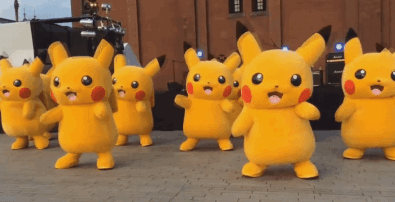
It’s hard to predict how long the Pokémon Go craze will last, but it doesn’t seem to be slowing down any time soon, especially since the app hasn’t even launched in certain regions yet (and they’re grieving appropriately). What is possible to say is that video games have reached a new level of notoriety in the public sphere, and while some may find the frenzy annoying, others have been able to deal with their illnesses, PTSD, and anxiety thanks to the app. Whatever the future holds, it’s sure to be interesting. -

The Hardest Thing About Being a Freelance Writer
Driving ferraris and attending lavish parties is what freelancers are made for, but that’s not the life freelancers actually live. With the luxuries of working from home and setting your own schedule come the immense hurdles of sporadic work availability and the too frequent non-payments. Though recently I’ve come across something I as a freelance writer, which I’ve deemed one of the greatest challenges we all fall victim to… the constant shuffle of changing your voice.
From famous authors to popular editorial outlets, everyone has their unique style. That style is the underlying factor that sustains a business—it’s recognizable and it relates to the audience interested in what that person or outlet has to say. For freelance writers, finding the balance between what your voice is and integrating the style of whatever publication you’re writing for is an important and delicate balance to accomplish.
Personally for quite some time my writing was ‘frank,’ with small bits of snark mixed in. Then when I joined Sarcastic Gamer, my writing took a sharp turn into the exaggerative. When I started freelancing more I toned down my voice to have a broader intonation, and as my career expanded I’d go back-and-forth between writing matter-of-factly or colloquial, often for several publications in the same day. I’ve also learned casual can mean different things for different places.
Today, there are moments I’m asked to completely adopt the voice of the outlet and abandon my own.
Truthfully this is how a writer develops their own voice, but I will admit there have been a few moments I’ve lost what I thought my style was. There were times I struggled to meet the needs of the outlets while reassuring myself I’m still representing myself accurately.
And that’s okay!
Life is all about evolving, so I’m still learning who I am and what that means for my writing. I’ve realized I shouldn’t allow those types of circumstances question my own capabilities; instead, I should meet the challenge head-on and take learnings from these experiences to help me advance my career.
There’s a lot of advice out there from more seasoned veteran writers available, but what I can say confidently to new freelancers out there is to take a breath and embrace the edits. Don’t take them personally, grow from the experience!
That said, don’t feel afraid to challenge edits you feel hinder what you know your voice to be. A good editor will explain in greater detail why they feel their edit was necessary, or find a mutual compromise. That way everyone involved learns from the exchange.
See every opportunity like a chance to develop into a better writer.
Be sure to also take the time to write for YOU, even if it’s just in a private journal, so you can learn who you are. And don’t buy a ferrari, unless you want it to catch on fire.
Read More -
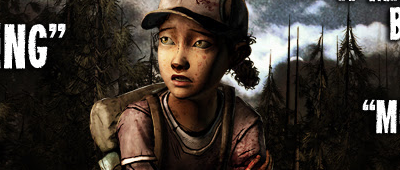
I’ve Been Quoted for a Game!
Below you’ll see a few outlets like IGN, GameInformer, and Machinima… that last one is me!
I’m so happy that my first endorsement quote is for a video game like Telltale’s The Walking Dead! It feels a bit surreal. I’m also relieved it was used in the right context, given some of the horror stories I’ve read on endorsement quotes.
Here’s the review in question the quote is referencing.
————————————————————————————————————————
UPDATE #1
I’ve been quoted for another game! This time for the beautiful little story of Aurora in Ubisoft’s Child of Light. Here’s the review the quote is referencing.
————————————————————————————————————————
UPDATE #2
Telltale Games is very kind, because they’ve quoted me again! The review in question is for the season finale of The Walking Dead, Season Two.
Read More -
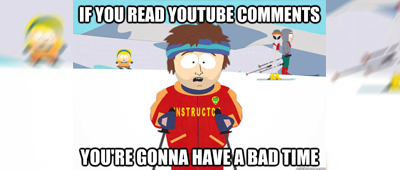
Social Experiment: YouTube Comments
There’s a reason Twitter feeds like @AvoidComments exist. Comments can range from encouraging or crushing, and no where is that most true than on YouTube. YouTube comments bring in all walks of life, and those walks can be pretty nasty.
But thanks to an unplanned social experiment, I learned there’s hope!
I found out that if you respond to snarky comments with kindness, the original commentor takes back their words and apologizes. It worked 9 times out of 10, so far, and that’s not including the individual messages I’ve received on Twitter and through e-mail further lamenting their original post. It’s satisfying to know when confronted with genuine honesty, people revert to good manners.
The Problem
When I’m tasked to review games, it’s often just for the written version to be posted on a website. We live in a digital world where people consume video content more these days, which has bumped up my responsibilities to capturing footage and tracking time codes for video reviews. I cover every step of the process except for the voice over, because although I’ve podcasted for a few years, VO is a field I’m not familiar with.
I’ve always wanted to voice over my own reviews; they’re my words, but often the individual reading them in the video gets the credit instead. Which is why when Polaris asked me to review Plants vs. Zombies: Garden Warfare, I agreed I’d cover the VO portion too. Not realizing what I was getting myself into…
The quality of the audio was bad thanks to the openness of my studio and the mic itself. No amount of takes and edits could remedy the sheer nervousness and blandness of my actual performance. It was just… awful, and I knew it the more I played it back to myself. But I had agreed to do the VO, so I recorded it and sent it to Polaris, making sure to note that I completely understand (and actually encourage) not using my VO. They decided to use it anyway, and Polaris’ community let me know how bad of an idea that was.
The Comments
I wasn’t ready for what would be said about me. A few of the terms used were soulless, robot, emotionless vegetable, etc. Some thought I needed to be put on antidepressants. Others were afraid I sounded like I was going to hang myself. A number of commentors tried to be positive and said if reviewing games doesn’t work out I can always do relaxation videos and sad documentaries!
All in all, it was crushing.
Thankfully, however, the community at Polaris is different than, say, Machinima. While a majority of the comments did mention they disliked my VO work, others made sure to state that it’s okay for my first time. Those people were the ones that encouraged me to leave some comments of my own.
I decided I should poke fun at myself instead of taking it all too personally, so I left a long comment explaining what happened. The result wasn’t grand: it didn’t change the dislike ratio of the video or stop newcomers from letting me have it, but the few that did notice my comment were very supportive and sweet. In fact, one YouTuber reposted my comment to make sure everyone saw it, stating that it’s nice when someone like me actually interacts with the community.
The Experiment
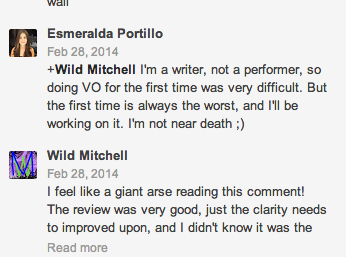
As you can see, people can be nice! At least when they’re confronted by the person they’re directing their mean comments to. There was one exception, but he lost steam after I kept replying to him as well.Despite the odd experience, I’m happy that out of it all I learned people are nice on the internet, it’s just hard to see past the knee-jerk reaction comments.
Read More -
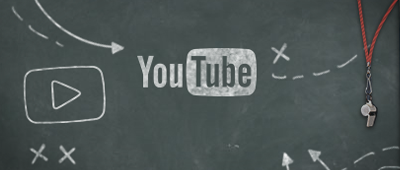
How to Beat Other Businesses on YouTube
YouTube is a wonderful platform that offers anyone the opportunity to upload their videos online and attract some of the most dedicated audiences out there. It’s a field of endless opportunities, but one that unfortunately many businesses (big and small) fail to understand. Simply following the basics guarantees you’ll be ahead of 80% of the other businesses on YouTube, bolstering your eventual video creation success!
Create Content You’d Like to Watch
It’s disheartening to see companies use their respective YouTube channels like asset dumping grounds. If you need a way to share your content for public relations assets, FTPs are the best option. Of course that’s not to say you can’t post your own ads on your channel, but a brand’s channel must bring value to their audience—what are they learning/enjoying from watching your videos?
“Content marketing is creating and distributing relevant and valuable content to attract, acquire, and engage a target audience.” That’s why companies that create content other than promotional material for their channel, such as tutorials, livestreams, behind-the-scenes footage, see more highly engaged fans who are willing to buy their product and promote it for them!
Never Forget Your Look
Some brands neglect their channel’s design, which is a BIG mistake! Failing to take the time to create custom headers and thumbnails to establish a look to your YouTube presence is a sure-fire way to scare subscribers away. PlayStation has the right idea.
Your Aim is Not “Going Viral”
Then there’s that phrase everyone who works on YouTube shudders at: “going viral.” Your goal should not be focused on making a viral video. A piece of content becomes viral because it’s something people are eager to share—whether it’s inspirational, eye-opening, terrifying, endearing—so that should be your aim. The only way to encourage people to share your content is to create amazing content, and think outside the box.
Work With Influencers
Advocates are fans you’ve managed to collect as a brand on your own, loyal patrons who adore what you do and are usually the first to spread your brand’s message along to their friends. These are the people ready to subscribe to your channel!
On the other spectrum are influencers, those who are already successful and popular on YouTube and have the experience you crave. Their fans trust everything they say, so influencers are powerful assets for your brand.
That said, when reaching out to influencers, treat them like the professionals they are! It’s true that YouTube is a field filled with cute cat videos, but that should not diminish the amount of time and effort these creators put into their own work. Approach them with care and, if you have the funds, reasonable deals. The one detail I cannot STRESS enough is not to impose on their creativity: they are not producing an ad for you. They’ve formed a connection with their fans because they’re truthful with them, and creating ads for your product with ‘corporate talk’ is more harmful to their personal brand than your product. Keeping that in mind, and trusting them, will lead to peaceful and successful roads.
Read More -

Stop Writing “Opinion” in your Opinion Headlines
Lately I’ve been paying closer attention to the headlines I click on in my RSS feeds. Evaluating what drives a user to click on a particular subject based on the format and keywords is fascinating.
I’ve really come to appreciate the simplicity of game industry headlines compared to those of general news outlets—mainstream media aims for witty but instead produces confusing and boring titles. Still, video game outlets are not without their faults, and there’s one in particular that I’ve seen so often I’ve developed a pet peeve for it…
Stop writing “opinion” or “editorial” at the
beginning of your opinion headlines!Editorial industry success usually comes down to the headlines. In print you feature the most eye-catching stories on the front cover to secure a newspaper or magazine sale. Online, the more eyes on your website means more ad revenue, and headlines are the attraction mechanic. Everyday it’s a fight against the collective noise of information overload, so it bewilders me that some outlets don’t realize they’re doing themselves a disservice by adding the disclaimer, “this article is about one writer’s opinion,” before a reader clicks on the article.
Let’s look at two examples:
- Opinion: This is how the Super Bowl looks like to me as a foreigner
- What the Super Bowl Looks Like to a Foreigner
Which are you most likely to click on? The second headline is vague enough that it could be an opinion piece, but it can also be interviews with fans from different countries, a video compilation showing the differences between the sport culture in America compared to the rest of the world, a roundtable discussion between experts, etc. It’s captivating enough that you want to know more, so you click.
The first headline already sets forth that it’s one person’s opinion. If a visitor glances the author’s name and see it’s not someone they recognize, they’ll most likely decide to skip the article together. But who knows if that visitor would have enjoyed the piece and fell in love with a new writer! Or even if they disagreed with everything the author said, they’d still have engaged the article.
Of course the argument then becomes, “But we don’t want to confuse the reader into thinking this is fact or a review of a product.” In the case of Destructoid’s “Opinion: Lightning Returns is by far the best ‘XIII’ game,” that’s definitely a possibility. But that’s a simple fix: inform the reader it’s an editorial piece within the article. Mashable has a disclaimer before the body of their op-eds:
In fact, Polygon goes so far as to have a more detailed disclaimer explaining how their opinion pieces are meant to begin dialogue within the community on a particular subject matter. That’s great! Though, outlets don’t even need to go that far. Game Informer has a small little icon under their headlines that clearly screams “this is an opinion piece!”… but they also write “opinion” in the title so there’s room for improvement.
Sometimes you may not need any sort of disclaimer at all. In my editorial “How Our Gaming Habits Evolve As We Age” it’s made clear early on that I’m writing about my personal experiences. Yet, the headline is general enough that it could have been talking about a study recently published. Who knows, you have to click to find out!
If you don’t have fancy HTML to input a disclaimer to the likes of Mashable or Polygon, adding a tagline is also an option. In that same article there’s a tagline: “Playing Final Fantasy for hours on end was a staple of my childhood, but now it seems there’s been a striking change in how I approach videogames.” It clearly sets forth that I’m talking about my experiences.
So…
To be clear, I don’t condone the practice of click baiting, that’s not with this article is about. Sites like Cracked—which I’m addicted to like… chocolate—are able to profit from click baiting practices (“Top 6 reasons why you suck at life”) because that’s what their site focuses on. Game industry websites take a more professional stance, so it’s a different scenario. My fear is that many outlets are losing on potential readership with these ‘opinion’ or ‘editorial’ headline precursors.
The word ‘opinion’ itself is just off-putting. I don’t want to read just your opinion; I want to read your convincing argument on why “Titanfall is the perfect game for people who are terrible at first-person shooters.” Wait, did a developer say that? Is there data that’s been published that confirms that? Let me click to read more… Oh, it’s just one editor’s opinion… Well I’m here already, and I’m intrigued, let me keep reading.
+1 new reader fan.
Read More -
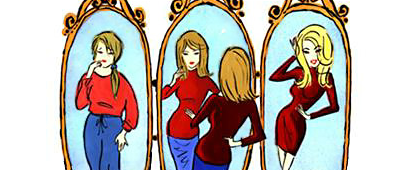
“You’re Too Skinny!” The Other Side of the Body Image Struggle
Living in Los Angeles has been an interesting experience. Stationary traffic and smog aside, it’s hard not to miss the heavy focus the LA culture has on health: protein shakes, gluten-free menus, sushi, yoga, juice cleanses, etc. It’s a city with “body image” as its core, and it’s one that can be quite overwhelming for newcomers.
Coming from Florida, you’d think I’d already have a grasp of societal pressures on body image; after all, Miami is all about the bikini body. Yet it wasn’t until I moved to the west coast that I really started to see how much looking your best was important… at least by LA standards, and how living here has affected me: I glance at storefront windows, looking past the merchandise to stare at my own reflection; I question everything I eat, even when it’s seemingly healthy; and I’m constantly wondering how others perceive me (my conclusion is usually negative).
Despite all this, I comfort myself in knowing that although I may be highly critical of myself, if I work hard I can be as happy as those women who are thin, healthy, beautiful, and thus comfortable with themselves. Right?
Right…?
I know quite a few gorgeous women, stunning really, who are extremely uncomfortable in their skin—and it frustrates me. How can someone look so good and still somehow be sad with their own reflection? How are there fit women out there who criticize themselves more than I do?! It’s possible, it’s happening, and it’s truly depressing.
There’s someone I’ll refer to as “Angie,” who’s tall and thin with curves in the right places, giving her a beautiful and unique frame. To say she has the body of a model is extremely accurate, because she is one. I envied her; she could wear a simple t-shirt and look amazing while I’m standing next to her looking frumpy and dull. And yet despite having a profession where she’s idolized for her looks, and reminded of how captivating she is every day, she still sees flaws. Flaws that are not actually there, but nevertheless traits she feels she needs to fix to be desirable.
Then we have “Danielle,” who despite having one of the smallest figures I’ve ever seen, still thinks she’s fat. In fact, she’s lost more weight since I last saw her. Yet with every compliment she receives, she negates it with a, “Oh no, I’m just sucking it in.” Although that’s humanly impossible, she tells herself this so she doesn’t accept her lovely body for how it is.
Finally, there’s my friend “Aisha” who is not only tiny, she’s extremely fashionable and always so well put together. Often I find myself dressing up a bit for our outings just to try to match up. Although she’s a gorgeous person, she too hates the way she looks. She doesn’t like being petite. One day she confessed she was trying to gain weight, just to stop her friends from commenting on her size, “I’m tired of my friends always pointing out how skinny I am. How it looks like I don’t eat, when I eat a lot. How everyone’s concerned with my looks.”
This threw for a loop. I can verify she does eat a lot, while still retaining her figure thanks to metabolism/genes/something I don’t have. But the key here is that she IS healthy; she’s not starving herself. But thanks to criticisms and even compliments about her size, she’s become extremely self-conscious about her own weight. She has a frame most women in Los Angeles would die for, but something she would do anything to change.
… I’m just stunned. It’s heartbreaking to see women I find stunning not comfortable with themselves either. That there’s another side to the body image struggle I rarely take into account. Those of us who feel we need to lose weight to achieve that model look aren’t the only ones in pain; the models themselves are struggling to find a happy balance with themselves.
I think it’s important to remember that we’re all under the same image pressures, and that it isn’t good for us. It’s time we feel comfortable for our own sake—health should be our goal, not what dress size we are. We have to stop caring what we think society perceives us to look like, and love how we are. Easier said than done, and it’s simpler to write the words than embody the message, but I’m so tired of it all. And I’m tired of being tired.
Read More








